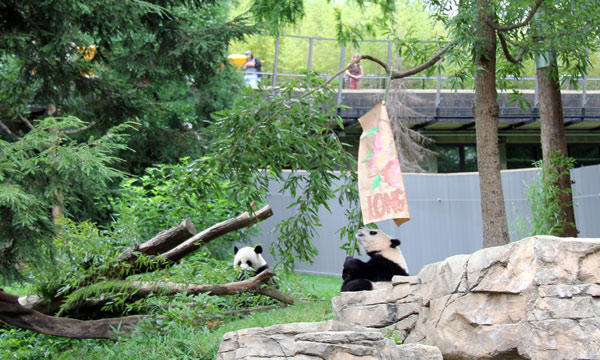Bao Bao gets birthday omens
Updated: 2014-08-25 05:01
By Liu Chang in Washington(China Daily USA)
|
||||||||
|
 Bao Bao plays Zhuazhou during his first-year birthday celebration hosted by the National Zoo and the Chinese Embassy in Washington on Saturday. Zhuazhou is a Chinese tradition to honor a baby's first birthday. Liu Chang / China Daily
|
Saturday the cuddly panda cub Bao Bao got her first birthday wish through zhuazhou, a Chinese tradition honoring a baby's first birthday dating back to the Song Dynasty (960-1279) where the one year old picks from an array of talismans that predict its future.
Bao Bao picked "good health" first, "long life" second, and "many cubs" last, which reflects "a very logical" choice, joked Chinese Ambassador Cui Tiankai.
Born on August 23, 2013, at 5:32 pm, weighing 4.8 ounces and appearing pink with white fur, Bao Bao just had her first birthday party hosted by the Smithsonian's National Zoo and the Chinese Embassy and starting with the zhuazhou ceremony.
In the panda yard early Saturday morning, the fumbling cub paced first behind a tree branch and eyed the visitors with her head lowered shyly. The she suddenly bounded excitedly towards the zhuazhou posters hanging from bamboo poles above a cave. The posters had peaches (long life), bamboo (good health) and pomegranates (many cubs) painted on them separately.
As one of the most adored species in the world, pandas are also a conservation-reliant endangered species. Native to south central China, pandas are classified as carnivorous in terms of taxonomy, but over evolution and adaptation to the changing environment, their diet has become mainly bamboo. There are currently 1,600 giant pandas living in the wild.
According to the Animal Fact Guide, one of the major things that threaten pandas is habitat destruction. With China's enlarging population, pandas' habitat is being pressured by economic development and pushed into smaller and less livable areas.
The encroachment leads to a lack of food as various forms of bamboo grow at different times of the year and if one kind is destroyed it can leave the pandas with nothing to feed on for long stretches of time.
Conservation efforts and breeding programs are being carried out to restore the panda population of China. Wolong National Nature Reserve in Wenchuan County, Sichuan province, established in 1963, houses more than 150 pandas. Chengdu Research Base of Giant Panda Breeding, a non-profit research and breeding facility in Chengdu, Sichuan province, established in 1987, has developed an artificial breeding population of captive pandas with 113 existing ones over the last two decades.
Dennis Kelly, director of the National Zoo, said the zoo, for decades, has had many scientific joint projects with China. "Chinese experts are much more experienced than we are, and we tend to learn from each other every day," he said.
Experts on both sides have worked on reproduction and diseases. Studying diseases helps put pandas back to the wild later in life. Although breeding pandas in captivity is very difficult, in the past 20 years, the zoo has progressed from a 20 percent success rate to 80 percent today.
"I remember feeling like an anxious father-to-be while waiting see if Mei Xiang was pregnant," Kelly said at the birthday party. "Today, we are celebrating one of our biggest conservation successes. It's been amazing for us, our members and all of Washington, DC, to watch Bao Bao thrive and grow. She is so much more than just a beautiful 44-pound cub. She represents decades of collaboration between American and Chinese scientists."
During former US President Richard Nixon's historic 1972 trip to China, the Chinese government donated two pandas, Ling Ling and Hsing Hsing, to the official United States delegation. The first pandas in America, Ling-Ling died in 1992 and Hsing-Hsing in 1999. Their five cubs between 1983 and 1989, all died as infants.
Bao Bao's parents, Mei Xiang and Tian Tian arrived at the National Zoo under a Giant Panda Cooperative Research and Breeding Agreement signed in January, 2011, between the zoo and the China Wildlife Conservation Association.
Bao Bao, whose Chinese name means precious or treasure, was named on the 100th day after her birth through an international online naming contest.
changliu@chinadailyusa.com
- Xinjiang publishes anti-terror brochures
- Security pact sealed with Afghanistan
- President Xi encourages international cultural exchanges
- Premier Li: China willing to help Afghan infrastructure
- Chinese FM: China, Asia-Pacific become community of shared destiny
- Foreign minister remarks on possibility of China-Japan summit
Most Viewed
Editor's Picks

|

|

|

|

|

|
Today's Top News
VW defends safety of recalled New Sagitar
Former premier makes Hurun philanthropists list
Xinjiang publishes anti-terror brochures
SOHO endows $10m to Yale
Cook and Ma talk about partnership
Language a barrier to healthcare for Asian Americans
China businesses need innovation: VC
Security pact sealed with Afghanistan
US Weekly

|

|
















